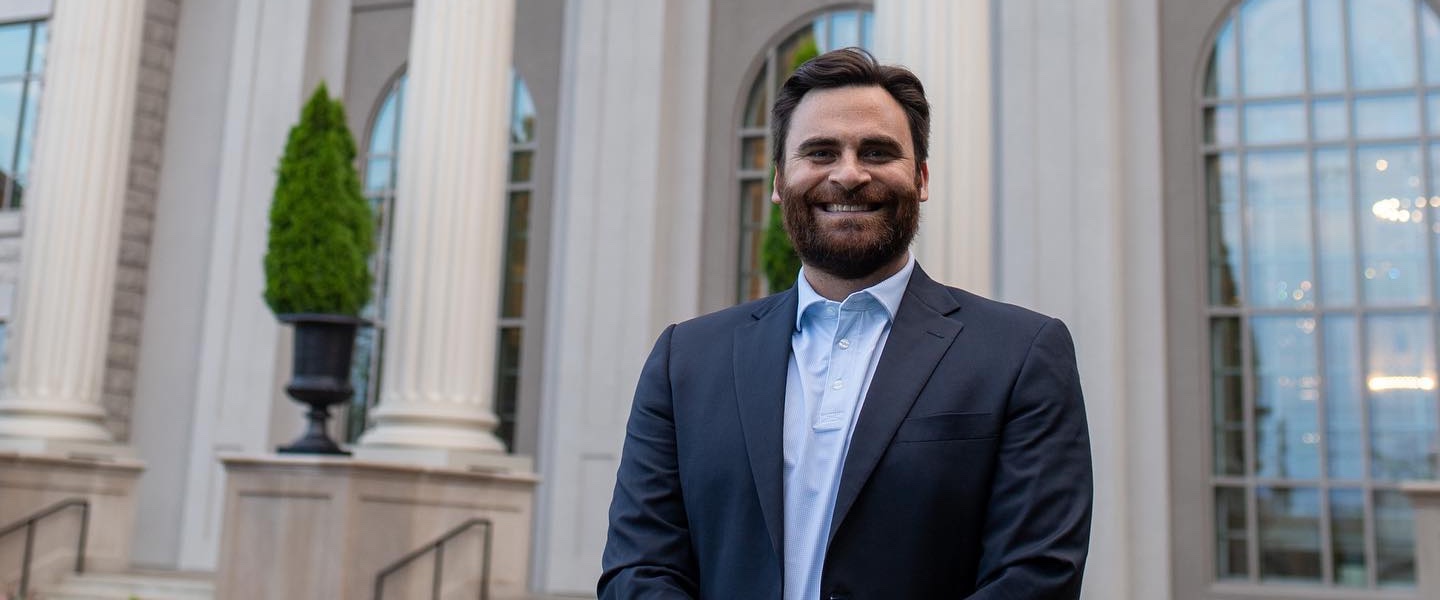In the ever-evolving landscape of education and educational leadership, it's crucial to understand how academic programs are adapting to meet the needs of both students and the field of education itself. In this piece, Dr. Jesse Wood, who serves as director of Belmont University's Ph.D. program in Strategic Leadership in Education (SLE) housed within the College of Education, shares insights into his background, his family, the program's alignment with current educational trends and what sets it apart from other Ph.D. or Ed.D. programs.
Q&A with Dr. Jesse Wood: Navigating the Educational Leadership Landscape
Tell me a little about your family and what you enjoying about Nashville.
 My beautiful wife Hailey and I have been married for 10 years this November and have two wonderful children, Hudson (5 years old) and Anne Mcall (3 years old). My talented wife Hailey is a proud Clemson University alum and is currently the Community Impact Coordinator at the United Way of the Ocoee Region. She has been instrumental in writing and facilitating numerous federal and private grants and conducting community needs assessments for non-profits in this region. Hudson is in Kindergarten and attends Woodsong Forest School. He loves nature, soccer and outdoor gear. Anne McCall is our resident artist that loves performing, cracking jokes and daydreaming. She already wants to apply to the College of Music and Performing Arts.
My beautiful wife Hailey and I have been married for 10 years this November and have two wonderful children, Hudson (5 years old) and Anne Mcall (3 years old). My talented wife Hailey is a proud Clemson University alum and is currently the Community Impact Coordinator at the United Way of the Ocoee Region. She has been instrumental in writing and facilitating numerous federal and private grants and conducting community needs assessments for non-profits in this region. Hudson is in Kindergarten and attends Woodsong Forest School. He loves nature, soccer and outdoor gear. Anne McCall is our resident artist that loves performing, cracking jokes and daydreaming. She already wants to apply to the College of Music and Performing Arts.
My family and I are enjoying getting to know the Nashville hotspots, music venues and great restaurants in the city. It's nice having a few more options than Bojangles and Cracker Barrel. This past August we discovered Opryland and the Soundwaves waterpark. This was a major selling point for my children who now associate Belmont to a waterpark. Nashville is an exciting city with so much going on to get involved in. Attending a Predators and Titans game is next on our to-do list.
Tell us about your professional background.
Prior to coming to Belmont, I worked as a public-school educator for Bradley County and Cleveland City Schools for 12 years. While a public-school educator, I completed my Ph.D. at the University of Tennessee, Knoxville in the department of Educational Leadership and Policy Studies. While preparing for my final dissertation defense in the fall of 2019, I was also interviewing for a faculty position at Lee University and that following spring, accepted a position as an Assistant Professor of Educational Assessment.
While at Lee, I helped launch a new Ed.D. program in Professional Practice that served local PreK-12 school leaders across Southeast Tennessee and North Georgia. In this program, I taught both quantitative and qualitative research methods and chaired multiple dissertations in practice. There, I discovered a deep passion for doctoral education and programmatic design structures that effectively train scholar-practitioners to bridge the knowledge-to-doing gap. This work inspired my current scholarship on dissertation mentorship and designing pedagogy that enhances the doctoral student experience in the classroom.
What motivated you to lead the Ph.D. program at Belmont?
In 2022, I learned about the new Strategic Leadership in Education Ph.D. program through a colleague and started seriously looking into Belmont University and the exciting new programs and initiatives that were launching. I was inspired by the College of Education’s clear mission and vision to teach brilliantly, innovate boldly, advocate passionately and serve faithfully to be the leading Christ-centered educator preparation program in the world. Additionally, the aspirational aim of Belmont University coupled with a clear articulation of how to get there through the five strategic pathways solidified my interest in joining the institution.
I then began digging into the design, structure and instructional delivery of the new Strategic Leadership in Education Ph.D. program. This program checked all the boxes of a high-quality, well-designed and attractive program that is accessible to working professionals. I knew immediately that I wanted to work in a program and institution like this and once a faculty position opened, I jumped at the opportunity.
How does the Ph.D. program align with current trends and challenges in the field of education and educational leadership?
Educational trends and challenges are always evolving in education. We could discuss at length a wide gamut of topics in educational leadership that include everything from navigating teacher shortages, the demands of assessment and evaluation, funding formulas, resource allocations, community engagement, data-driven decision-making and the political landscape and its impact on educational policy. However, the emphasis on diversity, equity and inclusion are, in my opinion, the current priority in educational leadership and in leadership training programs.
Educational leaders are tasked with the great responsibility of creating inclusive environments that provide equitable educational opportunities for all students to thrive. As a strategic leadership program, it is our job to equip our students with the leadership skills to do this successfully and to address these challenges head-on. Our multidisciplinary program does this by infusing leadership and equity in the programmatic structure, core coursework and in a specialized concentration.
What sets this program apart from other Ph.D. or Ed.D programs?
In my opinion, our multidisciplinary approach to leadership training is what uniquely distinguishes our Ph.D. program from other programs across the country. We have strategically designed a programmatic sequence, coursework and three-day on-campus residency experience each semester that infuses leadership theory, applied research and equity and justice in a variety of specialized concentration pathways. Further, we are designed to bridge the knowledge-to-doing gap and equip scholar-practitioners to contribute meaningfully to a relevant field of scholarship while providing a tangible improvement deliverable to an organization. We have high expectations for the scholarship our students will contribute and don't want their research to be isolated in the archives of higher education and disconnected from those actually doing the work. We expect their research to extend the extant literature on a topic and improve the work of practitioners in their educational settings.
Additionally, there are plenty of programs that offer online or hybrid models to doctoral training for working professionals, but many tend to struggle in fostering community, student engagement, mentorship and professional induction for students due to the challenges that distance education inherently presents. We have designed the SLE Ph.D. program at Belmont University with these challenges in mind and have created what I believe to be a balanced program that is highly accessible to working professionals across the country, while providing intentional on-campus and online opportunities each semester that enhances the student experience and addresses these challenges.
What kind of research problems or topics are students exploring in the program?
Our students come from a wide range of educational settings and are interested in a variety of research problems. These include problems surrounding job-embedded and teacher apprenticeship pathways in Tennessee, student well-being in higher education, disparities in museum curator leadership, presidential leadership in public universities, student veterans in higher education, the Tennessee Learning Loss Remediation and Student Acceleration Act, social justice leadership, effective leadership in PreK-12, etc.
How does the program leverage Belmont's resources and location for its three concentrations: Educational Leadership, Management and Entrepreneurship and Faith and Justice Leadership?
The SLE Ph.D. program is fortunate in that we have incredible faculty from various departments across Belmont University to support these concentrations and offer specialized courses in related fields. Our students are afforded with the unique opportunity to take coursework from specialized faculty in the College of Education, Massey College of Business and College of Liberal Arts and Social Sciences for their concentrations. Further, our geographic location in Nashville affords our program a unique opportunity to be in close proximity to various educational leaders and organizational entities that influence various sectors state-wide.
Finally, what advice would you give to prospective students considering the program and what can they expect from their educational journey?
As you search for a suitable Ph.D. program that fits your educational and professional interests, you will find no shortage in programs offering streamlined pathways to a doctorate. However, don’t settle and sell yourself short from the rich experience doctoral education should provide. Look for a program that is transformative in nature and designed to critically examine and interrogate complex educational issues and solutions – one that will elevate your leadership potential, empower your professional practice, grow your professional network, equip you to leverage research methods, develop your scholarship and change you through the process. This is what you can expect from the Ph.D. program in Strategic Leadership in Education at Belmont University.
For more information about Strategic Leadership in Education, visit the College of Education.

